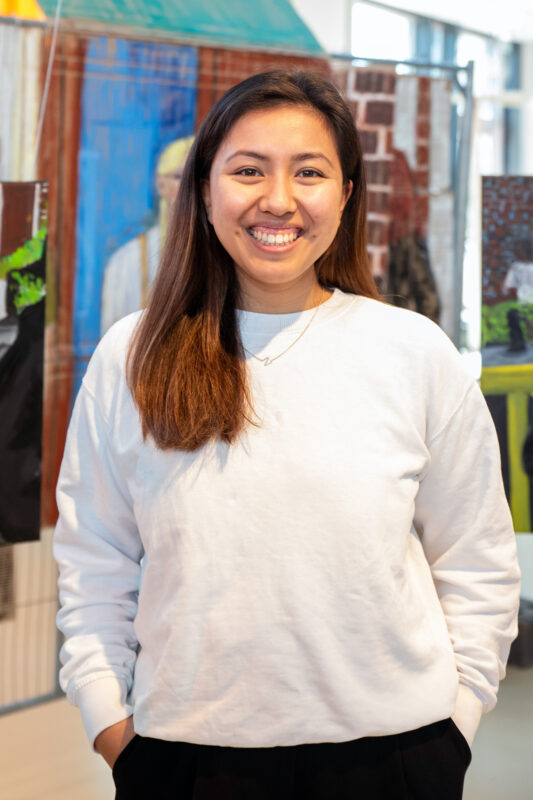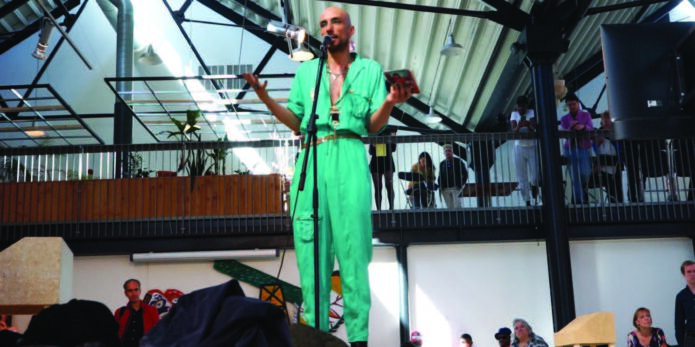 Fabian Holle during the opening speech of LIMBO – Still from video by Farouk Ebaiss
Fabian Holle during the opening speech of LIMBO – Still from video by Farouk Ebaiss “Ever tried? Ever failed? No matter. Try again. Fail again. Fail better”
LIMBO is a project welcoming all queer individuals with a refugee background; a creative research collaboration between queer/migrant artists and community organisers, Framer Framed and Refugee Academy.
LIMBO series wraps up its activities with a conclusive presentation. Below is the opening speech by Fabian Holle on the occasion.
Fabian Holle
March 27, 2022

Fabian Holle during the opening speech of LIMBO – Still from video by Farouk Ebaiss
Hello everyone, my name is Fabian Holle.
Thank you all for coming in such large numbers. We were already sold out a few days back. I want to try and keep it short, but I also have quite some things I want to say. I want to explain the project LIMBO. I want to introduce myself a bit. I want to explain what the term LIMBO means. I want to share some practicalities and intentions for the space, and I want to thank a few people. First of all, I want to congratulate Mama Kil on their 30th birthday! Let’s sing all together: Happy birthday to you! Today is co-organised by Mama Kil and Sehaq Queer Refugees Group, and we celebrate Mama’s birthday.
Firstly, I will briefly explain the project. LIMBO is a creative research collaboration between the VU, Framer Framed, and queer refugee community organisers and artists. LIMBO is a workshop series for and by queer/ refugee/ migrant community organisers & artists with the aim of creating a safer space for queer people with a refugee background to share stories and create content.
After eight workshops being by ourselves, we are now presenting some works and celebrating it with performances. LIMBO is part of my research on community engaged scholarship. I’m a PhD candidate within the department of sociology at the VU. I organised LIMBO together with Noa Bawits. Noa works here at Framer Framed as an educational officer, and she is also doing a master in sociology at the VU. I’m supervising Noa’s master thesis together with one of my own supervisors: Halleh Ghorashi. We want to know how the university can be more engaged with communities, and how collaborations such as these, including the art institution, can be decolonial, sustainable and reciprocal in terms of knowledge and resources. Oftentimes, social science is very distant from communities, because there are scientific norms of objectivity, seriousness, scientific rigour and being correct within one discipline and its rules and conventions. These norms, however, may be problematic in that they sort of fail to see participants as equal partners, as friends or even as humans. Community engaged scholarship questions such norms, is a bit in-between disciplines, and co-creates knowledge with rather than about communities. We focused on humanising the research. We brought soup every time and spent time eating together, drawing, writing or whatever creativity was proposed in the workshops.
Now I have arrived at the second point, who am I? This is a difficult question. What is relevant to say about me? It really depends on who’s listening, right? In our second workshop about story creation, Rochita, the workshop facilitator, had a beautiful solution for this problem. We could pick an object and say something about why we picked that object which in turn says something about ourselves in that moment. That is perhaps more relevant, because labels never really seem to fit me. I studied theatre, but I’m not really an actor. I like makeup, glitter and cool outfits, but I’m not really a drag queen. I’m not sure if I’m really an artist. I’m not sure if I’m really an academic. I’m ín the university, but not really óf the university. In gay culture, you have all different labels which makes you desirable for those who are looking for that specific type. Well, I don’t fit any of those. I’m not a twink, not a daddy, not a bear, not an otter, not a jock. I’m really in-between on many levels, not really this, not really that. Not really male, not really female. Not really gay, not really straight. Not really white, and I am not even sure whether I can say I’m a person of colour with my Dutch-Indo background. I’m not really masculine, not really feminine. You could say that I fail at all these things, I fail at masculinity, I fail at femininity. Beckett famously wrote: “Ever tried? Ever failed? No matter. Try again. Fail again. Fail better.”
I’m currently reading the Queer Art of Failure, by Jack Halberstam. They say, and I quote, that: “Under certain circumstances failing, losing, forgetting, unmaking, undoing, unbecoming, not knowing may in fact offer more creative, more cooperative, more surprising ways of being in the world. Failing is something queers do and have always done exceptionally well” (Halberstam, 2011, p 2-3). For some, it’s a way of life. And although it may be very difficult, because failure goes hand in hand with disappointment, loss, disillusionment and despair, it can also liberate us from the ruthless pressure of succeeding, of arriving at a point that is considered good, or compatible with the system. Because, for me, and many of us I believe, we will always be in-between. We will never arrive. Sometimes, we don’t want to be part of a system that is excluding people, so we intentionally fail to be part of such systems. Queerness however, celebrates these failings. We can thus be very successful at being in-between, at being queer, at challenging the system. We are here, we are queer, system change is very near!
Mala Badi, has reminded us, through their workshop, the importance of joy, clowning, playfulness, and how such values can liberate us from the restrictions of how we think we are supposed to act to fit in. To quote again from the Queer Art of Failure: “to resist mastery and privilege stupidity” (Halberstam, 2011). For me LIMBO is about acknowledging the difficulty of being in LIMBO, to create a space where it’s safe to fail, to be vulnerable, to make mistakes, to be awkward, and at the same time acknowledging the strength, the creativity, the reflection, the joy and activism that being in-between brings.
My third point was explaining what LIMBO means. LIMBO refers to this in-betweenness. There are a few definitions of the term limbo. One definition used by the Roman Catholic church is a place after death which is neither heaven nor hell. It’s claimed that people that died unbaptised stay in limbo.
The second, is the limbo dance where you walk under a stick that goes lower every time. Third, is the meaning we are referring to, namely an intermediate or transitional place or state, also a state of uncertainty, a state of in-betweenness. Queer people with a forced migration background often experience in-betweenness on many levels. In terms of migration, not really there anymore, but also never really perceived as Dutch (if we focus on the Dutch context).
People with trans experience who transition are in LIMBO. However, most queer and trans people never arrive, because we do not properly fit a certain label of masculinity or femininity for example.
Queerness celebrates and fully embraces this in-betweenness. It challenges norms concerning gender, sexuality, relationships, capitalism, neoliberalism and so on and so forth. It challenges ‘common sense’. It has the potential to challenge taken-for-granted systems and structures.
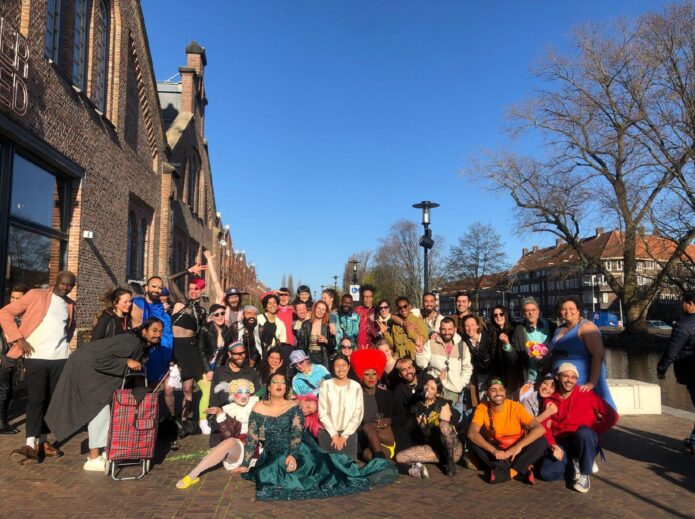
LIMBO group photo during the opening – Photo by Tino
Which brings me to my fourth point, some intentions for the space. As mentioned, we mainly tried to create a safer environment for everyone to feel comfortable with uncomfortable feelings and share their stories or creativity. This is a fine balancing act. Because what is safe for some, might be very uncomfortable for another. One participant put it beautifully: “we share similar pain and struggles but hold it in different ways”. The different ways can be comfortable for one and uncomfortable for another. Honestly, I feel nervous for today, because managing safety in a small space is already a task, but managing safety in a huge event like this, is very overwhelming. We went from private to public, and in public there is always more risk.
Please remember the most important thing: consent is key. We started the LIMBO workshop series with Maha Youssef who practised with us the importance of consent. Dana, one of the performers of today, put it very clearly: consent means that it’s mutual, active, enthusiastic and revocable. Yes, we both like this. This refers to pictures for example. Always ask the person if they want to be photographed.
If you are unsure, then it means no. Another very important example: no touching without consent. You would be surprised how many people think it’s okay to hug, or touch our hair, our wigs, our costumes, our butts or anything without asking. This is not okay, so when in doubt, never touch! First ask, can I hug you? May I touch this fabric? It has been an emotional journey for us, so just be kind, be soft, be gentle. Thank you.
The walls in the LIMBO space are wrapped in paper, you are welcome to leave messages on the wall. Just like we did and will continue doing. The space stays in LIMBO, always in transition, never reaching its final destination.
Lastly, I want to thank a few people. First of all, my partner in crime, Noa Bawits, Noa, you are amazing, thank you for everything you have done. I’m sure Framer Framed is very happy to have you, because you are doing incredible work! Thank you Framer Framed and everyone working here for creating a welcoming environment. It has been really nice, also coming here on weekdays and sharing lunch or small chats. I think you are an example for art institutions on how to open your doors for communities to provide space and resources.
Thank you to all participants that are part of LIMBO. Thank you so much for showing up, for sharing your stories, for drawing, writing and just being with us! Thank you for being vulnerable with us. It has truly touched my heart. Let’s talk soon, because I would love to know you better, learn about your experiences, and how we should continue this collaboration. Thank you so much to all the workshop facilitators: Maha Youssef, Rochita Loenen-Ruiz, Parisa Akbarzadehpoladi, Lamin Barrow, Mala Badi, Jerrold Saija, Sarah Naqvi. You gave us so much! Thank you, thank you, thank you!
Then, I want to thank a few people in particular, Alaa, for your generosity and energy, your beautiful works and everything you did. You did a lot.
Ariya for your beautiful works, for making the booklet and flyer, and all your work behind the scenes. Farouk, thank you for your amazing energy, your commitment and engagement. I really appreciate it. I want to thank all the performers that are yet to perform. Thank you so much for sharing your art with us, I can’t wait! Thank you to my supervisors Halleh Ghorashi and Elena Ponzoni and the entire research team: Maria Rast, Tara Fioroto, Mimi Ocadiz, Alex Greene, Phoebe Kisubi Mbasalaki and Kay Mars. You are all amazing feminist, forward thinkers, and I’m super humbled learning from you and doing this research together with you, absolutely life-changing, thank you. Mama Kil, thank you for organising this and all your work also in preparation of this project. Mama and I have been working together on two similar creative research projects leading up to LIMBO. I appreciate everything you are doing for the community. Thank you. Thank you visitors for listening and sharing the space with us.
Queer / Community & Learning /
Exhibitions
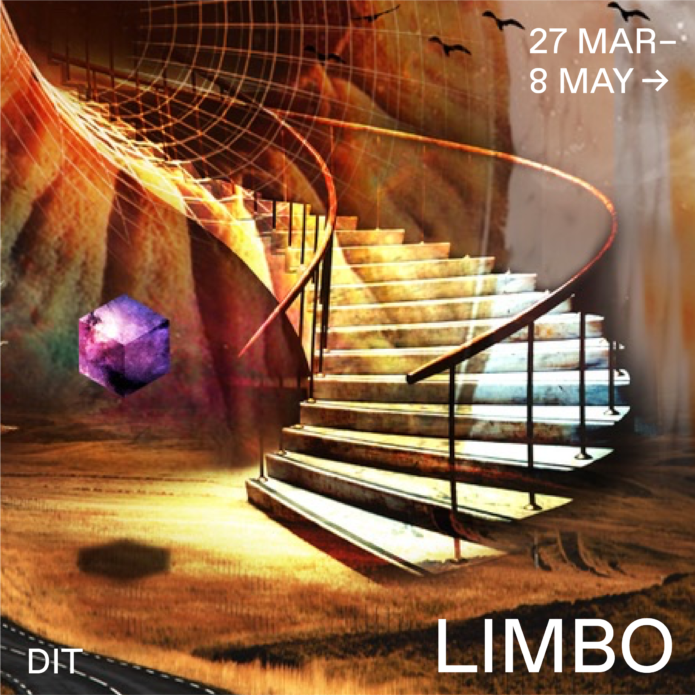
Presentation: LIMBO - queer exilic narratives
The final presentation of 'LIMBO: Engaged scholarship and queer exilic narratives'
Agenda
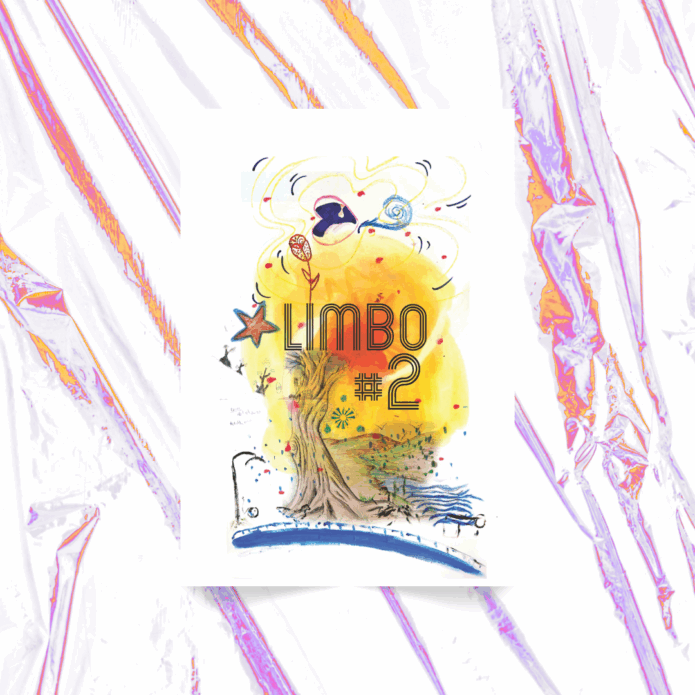
Launch: LIMBO Booklet
The launch of the second LIMBO booklet with an afternoon of art, food, music, rhythm dance and celebration
Queer Poetry Night x LIMBO
In collaboration with Unwanted Words & Queer Currents
LIMBO: Engaged scholarship and queer exilic narratives
A creative workshop series for queer, refugee and migrant community
Network
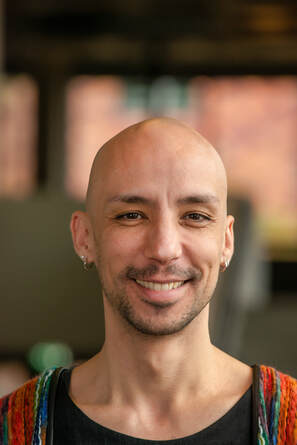
Fabian Holle
Researcher
